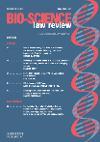Bio-Science Law Review - Volume 19 - Issue 2

ARTICLES
DOES A PATENT REALLY GIVE RISE TO A MONOPOLY? ARE ANTITRUST ATTITUDES AFFECTING THE COURTS' APPROACH TO GRANTING INJUNCTIONS?
Gordon D. Harris
Gowling WLG (UK) LLP, London
The assumption that a patent right amounts to a monopoly which is legally granted and enforceable has for centuries underpinned patent law in England and Wales. The author questions whether, in the light of recent cases, this monopoly right is now under threat, and is in danger of becoming little more than a right to receive royalties or damages in the context of a generic market.
UNIVERSITY INVENTIONS: WHEN IS A STUDENT A CONSUMER? OXFORD UNIVERSITY INNOVATION v NANOIMAGING LIMITED
Seaghan Davey
11 South Square Chambers, London
Issues arising in this case are, it is argued, especially common in collaborative research in the life sciences sector. These include the question of whether a PhD student is a consumer or an employee, the fairness of IP provisions in PhD contracts and whether universities retain too much equity in spin outs. As demonstrated in this judgment, the particular circumstances of researchers’ employment may well determine where any benefit lies should a commercially viable invention be made.
SEVEN MORE ISSUES FOR THE UPC, ON JURISDICTION AND PROCEDURE
Paul England
Taylor Wessing, London
Following his previous article on seven patent law issues the UPC will need to resolve quickly, the author now comments on seven more issues that demand urgent resolution, this time in the area of the court’s jurisdictional and procedural powers. These are also fundamental to the operation of the court.
LIFE SCIENCES: 2023 TRENDS
ADAM GOLDEN AND HARRIET HANKS ET AL.
Freshfields, London and New York
In their survey of current trends in the life sciences, the authors consider developments in the EU and the US. These relate, among others, to transactional activity, MedTech regulatory issues and antitrust enforcement. International tax reforms also come under scrutiny along with major regulatory changes in the EU.
GENUS-SPECIES CASES UNDER INDIAN PATENT LAW: A STORY OF FORKS AND SEMANTICS
ADARSH RAMANUJAN
Law Chambers of Adarsh Ramanujan, New Delhi
This article traces the evolution of the law concerning genus-species patents in India over the last five years, an issue which has given rise to two seemingly irreconcilable lines of jurisprudence, each applicable to cases involving a specific set of facts. Surprisingly, the demarcation between the two lines has little to do with substantive patent law. It is grounded in a well-known principle of equity, quod approbo non reprobo. The article aims to make pragmatic sense of the spaghetti-like situation that has arisen from a practitioner’s perspective.
CASE COMMENT
THE TECFIDERA REGULATORY PROTECTION DEBATE COMES TO AN END: SUMMARY AND IMPLICATIONS OF THE CJEU POLPHARMA JUDGMENT
NATALIE COAN AND STEFAN VAN KOLFSCHOOTEN
Pinsent Mason, London
This case concerned the issue of whether a product fell within an existing global marketing authorisation and in the unusual circumstances where another competent authority of an EU Member State had already taken a decision. In its judgment the CJEU overturned the earlier decision of the EU General Court, thereby seemingly restoring the regulatory exclusivity in Tecfidera.
